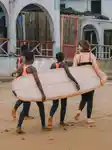In our MECCA M-Powered interview series, fearless women from around the globe share their incredible stories – from overcoming adversity to following their passions and inspiring a future generation of female changemakers.
“I grew up in Denmark,” says Lucy Small – surfer, director and activist for gender equality in sport – which may make you wonder how she became a professional surfer… that is, until you realise she’s referring to the coastal town in Western Australia, not the European country! “Denmark has a beautiful coastline and there’s not a whole lot to do. My parents lived close to the beach, so I would spend all summer there. I had a real love of the ocean from the beginning,” she tells MECCA.
Small was 14 when she first started to surf, and now, 15 years later, she’s still chasing waves – and making them. As her surfing career developed, Small started to notice the disconnect between the stereotypical ‘surfer girls’ depicted in advertising or media and the women who were actually in the water.
“The people represented are usually very thin and not very muscly – that’s not necessarily an accurate depiction of what your body is like when you're a surfer, which is usually covered in bruises, chafing on your tummy, big shoulders and weird tan lines,” Small reveals. “What you see in surf advertising are these runway-ready bodies – it's not what it's like as a day-to-day surfer.”
A turning point
The more Small became engrossed in surf culture, the more she noticed something unsettling about the surf industry – the lack of equality and representation for women. It started with the surf magazines; every issue was filled with photos of male surfers, and the few times women were included, they were often portrayed as sex symbols rather than skilled athletes. It was the same in films.
When Small won the Curly Maljam (Australia’s premier longboard surfing event) in 2021, she was awarded a cheque for $1,500 – less than half the male winner’s prize money of $4,000. When she stepped up onto the stage, she voiced the inequity: “I had watched Girls Can't Surf – literally the best surf film ever made,” she recalls. The documentary follows the journey of a band of renegade surfers, including Stephanie Gilmore and Layne Beachley, who take on the male-dominated world of professional surfing to achieve equality and change.
“That movie had inspired me so much, yet there I was accepting a cheque for not even half of the men's prize money,” Small tells MECCA. So, standing on the stage with a microphone in her hand and the attention of every person in the room, she spoke up and called out the competition’s organisers.
“I thanked the sponsors for the money they put into the event, and then added, ‘It was a bittersweet victory knowing that our [prize money] is less than half of the men's prize money. It costs the same to drive here; flights cost the same, accommodation costs the same – but our surfing's worth half as much. Maybe you can think about that for next year,’” she recalls.
It was the moment that changed everything. “I had no concept of the gravity of what I had done at the time either. In the past, when I had tried to raise issues of gender equality through surf journalism, it would get knocked back,” says Small.
This time, the opposite happened: “I remember it being such a huge moment in the media. It was all over the radio and TV. It was everywhere. The World Surfing League was so embarrassed about it all that they made the announcement they were bringing in equal prize money.”
That wasn’t all – after Small’s gamechanging speech, Surfing Australia changed their rule book to have equal prize money too.


She’s always led the way
Small has always stood up for what she believes in (at school, she even spearheaded the 'Year 12 revolution’ to try and save Muck Up Week from being cancelled!). “I've always been a really outspoken person. I've always been somebody that has not fully understood the value of people's perceptions of me,” she reveals.
So – what does it feel like speaking up? Breaking the deafening silence that surrounds so much of what women experience? “It is a really difficult thing, because as soon as you take a position on something, you stand to lose something too. [But] this whole experience has been a process of realising that nobody I respect has questioned what I'm saying.
“Anybody who has dismissed what I'm trying to put forward or who hasn't been supportive of it is somebody who I realise I don't share values with anyway, because I'm putting forward something very simple: it's gender equality. And if you don't believe in that foundational idea, then I feel like we probably weren't ever truly friends anyway.
” As an activist and advocate for change, there are, of course, moments of self-doubt; at times, Small questions if she’s being too outspoken. “I’ll ask myself, am I too annoying? Sometimes, I just want to give up because it just would be a lot easier. A politician once said to me: ‘Don't let any of what is being thrown at you derail you from your message, because you know your message is true and what you're doing is right.’
“In the end, if we get to where we are trying to go and I've played a part in that, that is going to matter so much more to me than whether or not somebody from some surf brand or a columnist or an organisation liked me. I do have to accept that at times I am being really annoying, and I just need to keep on being really annoying!”
Yet, what Small might term ‘annoying’ reads more like persistence – something we need above all else if we are to achieve gender parity.
Recently, Small was asked to speak on a panel at a surfing event – an invitation that ended up being rescinded shortly afterwards. The explanation? “’There was someone who confirmed at the same time as you and they have a disability, so we are going to have them speak instead,’” Small recalls being told. When she asked who else was on the panel, she realised eight of them were men – and the panellist who had replaced her was the only woman.
Small’s response was simple: “I suggested they could think in the future about having more women.” Small was reinstated – alongside the other female panellist.

A mission to spark change
Small’s next project launches this month: a short surf documentary entitled Yama, filmed and edited by British filmmaker Maddie Meddings. It follows Small to Ghana to meet with a pioneering group of female surfers and skateboarders, and explores the long history of surfing in the African nation – the Ghanaian people were known to stand up and ride waves on wooden boards and surf canoes long before European contact, and the first written account of surfing came from Ghana in the 1640s.
Based on the work of surf historian Kevin Dawson, the film proposes that the small community of surfer girls in Ghana’s Western Region are reclaiming their relationship with the Atlantic Ocean after hundreds of years of disruption due to colonial occupation.
“For so long, traditional surf media and advertising have shown a really one-dimensional identity of the surfer. We’re seeing this start to change, but it’s important that we keep telling these stories to ensure that surfing becomes a more inclusive place and everyone can feel like they belong in lineups. We hope this film makes a contribution to this shift,” explains Small.
“This is the first film project I have led, and it was such an exciting opportunity to go to Ghana and meet with women and girls who are choosing their own paths to surf and skateboard. It has also felt important to work on a female-led project, telling a story of women and girls pushing boundaries.”
When she’s not breaking news about gender inequality or directing documentaries, Small is – naturally – in the water with her surfing community. “There’s an amazing camaraderie and companionship that I have with other women through surfing,” she says.
Small is the voice of future female surfing generations – championing community, connection and change – and something tells us she’s going to be making waves for years to come.





